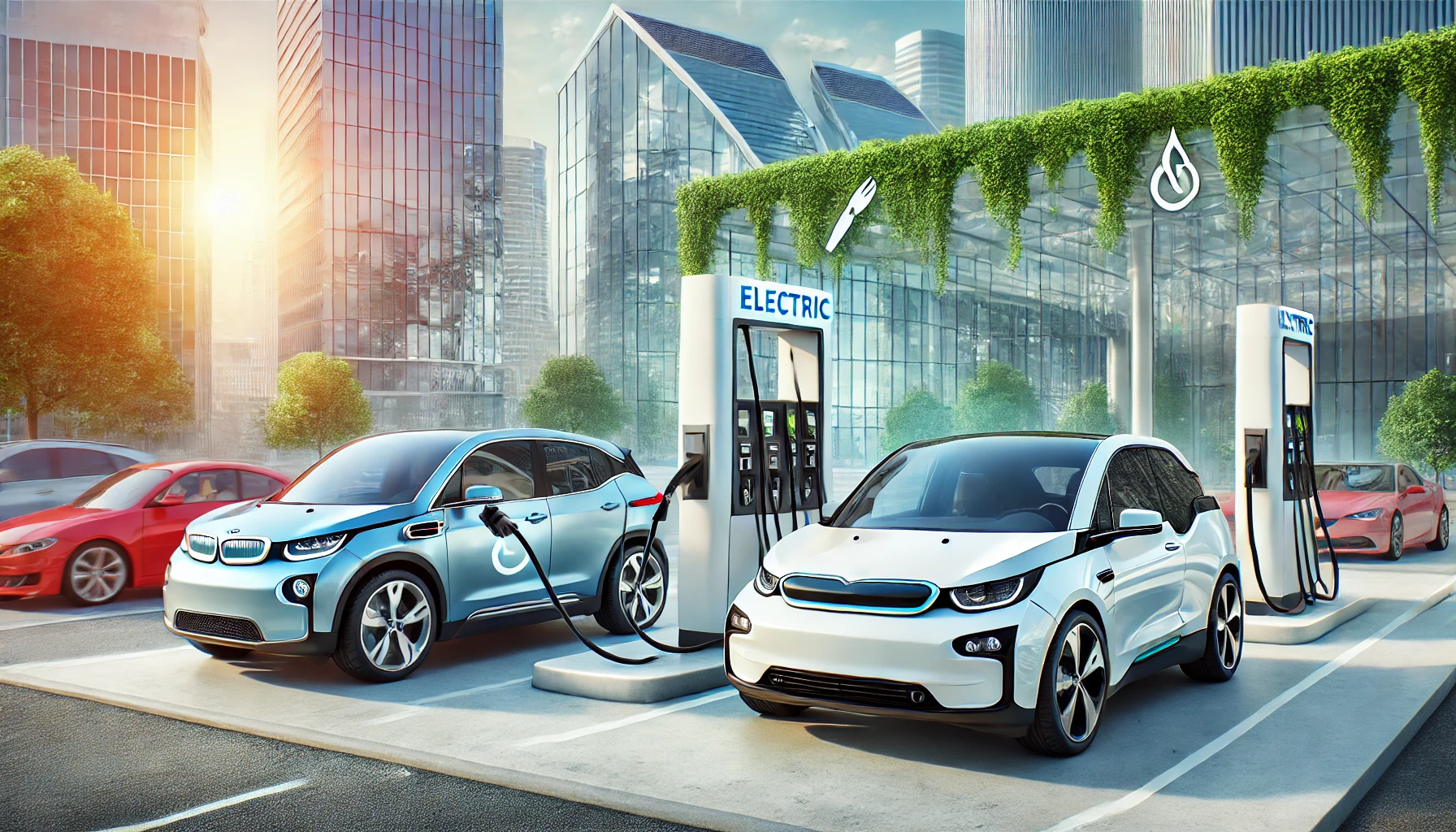In today’s evolving automotive landscape, selecting the right car can be overwhelming. The rise of electric and hybrid vehicles adds to the complexity, but making the best decision depends on your driving habits, environmental concerns, and budget. Understanding the key differences and benefits of electric, hybrid, and gasoline cars is essential. This guide provides a comprehensive breakdown of each option, helping you determine the best fit for your needs.
Understanding Electric Cars
Electric vehicles (EVs) have emerged as a popular choice for environmentally conscious drivers. Powered entirely by electricity, EVs run on rechargeable batteries and produce zero tailpipe emissions. The appeal of electric cars lies in their minimal environmental impact and lower running costs, thanks to the efficiency of electric power over gasoline. However, potential buyers must consider factors such as charging infrastructure, range anxiety, and initial purchase price.
The Benefits of Driving an Electric Car
One of the most compelling reasons to choose an electric car is its contribution to reducing your carbon footprint. EVs eliminate the need for gasoline, helping to curb greenhouse gas emissions. Another advantage is the cost savings on fuel and maintenance, as electric motors require less upkeep than internal combustion engines. Additionally, many governments offer incentives and rebates for EV buyers, further lowering the financial burden of going electric.
Challenges to Consider with Electric Cars
While electric cars offer numerous advantages, they also present challenges. The most significant is the availability of charging stations, which can vary depending on your location. Although urban areas are increasingly equipped with public chargers, rural areas may pose a problem. Range anxiety—the fear of running out of battery power during a journey—also remains a concern for some drivers. Lastly, electric cars tend to have a higher upfront cost, though this is often offset by long-term savings on fuel and maintenance.
Why Hybrid Cars Offer the Best of Both Worlds
Hybrid cars bridge the gap between traditional gasoline vehicles and electric cars by combining an internal combustion engine with an electric motor. This dual-power system allows hybrids to switch seamlessly between gasoline and electric power, offering better fuel efficiency and lower emissions than gasoline cars. For drivers who want a more eco-friendly option without fully committing to an EV, hybrids provide an excellent middle ground.
Advantages of Hybrid Cars
Hybrid vehicles are ideal for those looking to reduce fuel costs without worrying about charging infrastructure. Hybrids use their electric motors to assist the gasoline engine during acceleration and low-speed driving, improving fuel economy. Many hybrids also feature regenerative braking, where energy from braking is captured and used to recharge the battery. This results in fewer trips to the gas station and reduced emissions, making hybrids an attractive option for environmentally conscious drivers.
Hybrid Car Limitations
While hybrids offer great fuel economy and lower emissions, they still rely on gasoline to some extent, meaning they don’t fully eliminate fossil fuel use. Additionally, hybrids often come with a higher price tag than gasoline cars, and their complex powertrains can lead to more expensive repairs. Drivers looking for an entirely green solution may find that hybrids don’t go far enough in terms of environmental impact.
The Reliability of Gasoline Cars
Gasoline cars have been the dominant choice for decades, thanks to their reliability, range, and well-established infrastructure. With gasoline stations readily available and a vast selection of models at various price points, gasoline cars remain a popular choice for many drivers. Their simplicity, compared to hybrid and electric vehicles, means that they often come with lower upfront costs and are easier to maintain.
Why Some Drivers Still Prefer Gasoline Cars
Despite the rise of electric and hybrid cars, many drivers prefer gasoline vehicles for their proven reliability and convenience. Gasoline cars are typically less expensive to purchase, making them more accessible to budget-conscious consumers. They also offer greater range and faster refueling times than electric cars, eliminating concerns about long-distance travel or waiting for a battery to charge. For those living in areas with limited charging infrastructure, gasoline cars may remain the most practical option.
Gasoline Car Drawbacks
However, gasoline cars are not without their drawbacks. They are less fuel-efficient than hybrids and contribute more to air pollution and greenhouse gas emissions. Additionally, as fuel prices continue to fluctuate, the cost of owning a gasoline car can add up over time. In contrast to electric vehicles, which offer lower operating costs, gasoline-powered cars may become more expensive to run as environmental regulations tighten and fuel prices rise.
Comparing Maintenance Costs: Electric, Hybrid, and Gasoline Cars
One critical factor in choosing between electric, hybrid, and gasoline cars is the cost of maintenance. Electric cars generally have fewer moving parts than gasoline vehicles, leading to lower maintenance costs. Without the need for oil changes, spark plugs, or exhaust systems, EVs tend to be easier to maintain. Hybrid cars, while more complex than gasoline cars, can also benefit from reduced maintenance, thanks to their partial reliance on electric power. However, hybrids can be more expensive to repair due to their dual powertrains.
How Driving Habits Influence Your Choice
Your driving habits play a significant role in deciding which type of car is best for you. If you mostly drive short distances in urban areas, an electric car may be the most economical and environmentally friendly option. On the other hand, if you frequently take long road trips, a hybrid or gasoline car may be more practical, as they offer greater range and refueling flexibility. Evaluating your daily commute, typical driving distance, and access to charging stations will help narrow down your options.
Environmental Impact of Electric, Hybrid, and Gasoline Cars
For environmentally conscious drivers, the choice between electric, hybrid, and gasoline cars largely comes down to emissions. Electric cars are the most eco-friendly option, producing no tailpipe emissions and helping to reduce overall air pollution. Hybrids, while still reliant on gasoline, offer lower emissions than traditional cars due to their use of electric power. Gasoline cars, by comparison, contribute the most to air pollution and global warming.
The Role of Government Incentives in Your Decision
Many governments offer incentives to encourage the adoption of electric and hybrid vehicles. These incentives can include tax credits, rebates, and reduced registration fees. In some areas, EV owners may also benefit from access to carpool lanes and reduced tolls. Hybrid vehicles may also qualify for certain incentives, though they are often less generous than those for fully electric cars. Understanding the incentives available in your area can significantly reduce the cost of switching to an electric or hybrid vehicle.
Long-Term Cost Savings of Electric and Hybrid Cars
While electric and hybrid cars often come with higher upfront costs, they can offer significant savings over the long term. Lower fuel costs, reduced maintenance, and government incentives all contribute to the financial appeal of these vehicles. Electric cars, in particular, offer the lowest operating costs, as electricity is generally cheaper than gasoline. Hybrid cars, while still dependent on fuel, offer better fuel efficiency than gasoline cars, helping to reduce overall expenses.
Performance Differences Between Electric, Hybrid, and Gasoline Cars
Performance is another factor to consider when choosing between electric, hybrid, and gasoline cars. Electric cars offer instant torque, providing quick acceleration and a smooth, quiet ride. Hybrids offer a balance between electric and gasoline power, with some models allowing you to switch between modes for optimal performance. Gasoline cars, while lacking the efficiency of electric and hybrid vehicles, are often preferred by drivers who prioritize speed, power, and traditional driving dynamics.
Resale Value Considerations
Resale value is an important consideration for car buyers, as it can affect the long-term financial implications of your purchase. Currently, gasoline cars tend to have a more predictable resale value, given their widespread use and demand. However, as electric vehicles become more popular and charging infrastructure improves, the resale value of EVs is expected to rise. Hybrids, with their fuel efficiency and reduced emissions, also hold their value well, making them a solid investment.
Charging vs. Refueling: Convenience and Time
One of the key differences between electric and gasoline cars is how they are powered. Electric cars require regular charging, which can take several hours depending on the charger type. While this is less of an issue for drivers who can charge at home overnight, it may be inconvenient for those who rely on public chargers. Gasoline cars, on the other hand, can be refueled in a matter of minutes, offering greater convenience for long-distance travelers. Hybrid cars provide the best of both worlds, with the ability to switch between gasoline and electric power.
How Infrastructure Affects Your Decision
The availability of charging and refueling infrastructure can be a deciding factor when choosing between electric, hybrid, and gasoline cars. In areas with well-established charging networks, electric cars are a viable option for everyday use. However, in regions with limited access to chargers, gasoline or hybrid cars may be more practical. As governments invest in expanding charging infrastructure, the convenience of owning an electric vehicle is expected to improve.
Future-Proofing Your Car Choice
As the automotive industry moves towards greener technologies, electric and hybrid cars are becoming the future of transportation. Investing in an electric or hybrid car can be a way to future-proof your purchase, ensuring that your vehicle remains relevant as environmental regulations tighten. Gasoline cars, while still dominant, may face increased restrictions and costs in the coming years as governments push for cleaner alternatives.
You Can Also Read : How to Increase the Resale Value of Your Car
Which Car is Right for You? Electric, Hybrid, or Gasoline
Ultimately, the choice between electric, hybrid, and gasoline cars depends on your personal needs, budget, and environmental concerns. If you’re looking for the most eco-friendly option with long-term cost savings, an electric car is the way to go. For drivers who want a balance between efficiency and range, hybrid cars offer an excellent middle ground. Gasoline cars, while less environmentally friendly, remain a practical and affordable option for many drivers.




